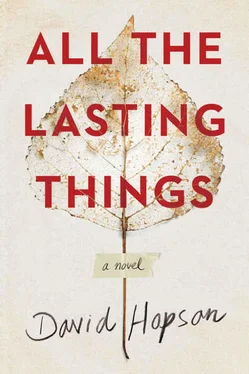“Oblomov?”
Benji winked. “This thirty-year-old guy who — wait for it — lays around in his robe all day thinking about all the great things he should be doing. Which of course he never does. He just gets fatter and lazier and more useless. And he knows it. That’s the tragic part. He knows. ‘He was painfully aware that entombed within him there was this precious radiant essence, moribund perhaps by now, like a gold deposit lying buried deep in the rock that should long ago have been minted into coin and put into circulation.’”
Max raised his hands in soft applause. “Impressive.”
“Not really,” Benji answered, giving his own robe a savage little flick. “Even bad actors can memorize. But that’s how I feel. Like the best of myself is still down in the mines. Uncoined. And nobody’s ever going to see it.”
“That’s not true. Cat sees it. I can tell by the way she looks at you that she sees something.”
“Honestly, I don’t know what Cat sees in me,” Benji admitted, sadness softening his voice. “But you’re right. I have Cat.”
They were quiet a long time.
“What about Arvin?”
“Arnav,” Max corrected. “What about him?”
“You didn’t say much last night, which I’ve learned doesn’t mean there isn’t much to be said. Where did you meet?”
“We played in the Dallas Symphony together,” Max answered. But the words had barely left his mouth before he started backtracking. “Wait. That’s a lie.” He cleared his throat. “No weirdness.”
“No weirdness,” Benji repeated, as if swearing to a pact.
“We met in the hospital.”
Slightly thrown, Benji said, “I thought you were going to say online. Doesn’t it seem like everybody meets online now? Especially gay guys. Did you know there’s an app that shows you how far you are from other guys who are looking to hook up? Oh, look, there’s a blow job, and it’s only one hundred feet away. I know most of them say they’re on there to network, but who networks with his shirt off?”
“What are you doing on Grindr?” Max laughed.
“That’s it: Grindr!” Benji said with a snap. “My friend Marshall showed me. I’m telling you, the gays have got it figured out. What were you doing in the hospital?”
“Same thing as you,” he said. He watched as his meaning sank in, as the weight of it dragged down the corners of Benji’s mouth. “Not a bridge,” he added, as if this detail somehow lessened the gravity of the act. “But. Yeah.”
“What? What did you do? When? Why?”
Max returned to his spot by Benji on the stairs. He kept his eyes on his feet, occasionally pulling a piece of wet grass from between his toes as he spoke. “Some of those questions are easier to answer than others. When? Two years ago. I was in Dallas, which I tell Arnav was reason enough.” Here, Max smiled, but his smile failed to smooth the creases that concern left on his uncle’s face. He went back to grooming the grass from his feet and kept his voice low. “I flew down a few days before this big Haydn festival I was scheduled to play. It was a Monday. I remember because it was the Monday before Thanksgiving. I was supposed to rehearse with the symphony at, like, two o’clock, but as soon as I got to the hotel, I pulled the curtains and got into bed and knew I wasn’t going anywhere. It was like the door disappeared as soon as I shut it: no way out. I’d been having a rough time for a while. A long while, but I kept going and going, traveling and playing, traveling and playing, doing it all like I was on a conveyor belt, but for whatever reason that day, the minute I laid down, I turned to lead.”
“You were depressed?” Benji asked.
“Depression and I, we’re on familiar terms, yes. When I was a kid, I didn’t know it was depression. It usually looked more like anger than sadness. Does Claudia? Does she get depressed?”
Benji wondered at this. “Not more than your average overeducated city dweller. Sometimes, I guess. Claudia plays her emotional cards pretty close to the vest.”
“Not me. I used to fly into these rages. Cursing my parents, throwing shit, wishing them dead.”
“Claudia wished our mother dead every day when we were kids,” Benji said, as if offering this genetic link might explain some aspect of Max’s diagnosis. Then, with his nose crinkled, he whispered, “You threw shit?”
“Jesus, Benji, don’t be so literal. I threw whatever I could get my hands on. My music stand. Plates. A ficus once, but no feces.” Max took a moment to recover from the scatological digression before picking up where he left off. “My parents bore the brunt of it. Strangers were safe. I never went off on Phillip Glass.” He laughed. “Or a fan or any of my mother’s awful, stuffy friends who she made me serve drinks to, play and serve drinks, but whatever was left when I was done with my parents got aimed at me.”
“What, like cutting?” Benji had seen a documentary.
“Except I wasn’t a cutter. I can’t stomach blood. I was a basher. I’d stand in front of the mirror and punch myself in the face until I had a black eye. I knocked a tooth loose once. Broke my ankle with a bat.”
“When you were how old?”
“Eight.”
“Your parents knew you were doing this?”
“I had excuses. I fell off my bike. I took a football in the face. But on some level they knew. I never played football in my life.”
“And they didn’t take you to a doctor?”
“Not right away. Amanda didn’t put two and two together. Or didn’t want to. Honestly, I think the tantrums thrilled her on some level. Convinced her I was the crazy genius she always wanted.”
“Like Mozart.”
Max made a gesture of concession. “My father used to say it takes a genius or a fool to pee in the punch bowl, but only the genius gets away with it. But then I started slamming my fingers in doors, and we couldn’t have that. You can get by on the cello with a busted leg, but not with a broken finger. That’s when she took me to the doctor.”
“What did he do?”
“She. Dr. Haze. Seriously. I had a psychopharmacologist called Dr. Haze. She put me on lithium, which did wonders for my vibrato.” Max simulated a severe tremor with his right hand. “I called her a few days before I flew to Dallas. Left a message that I felt like I was going to — you know.” Here, Max held an invisible noose with one hand and let his head drop. “She never called me back. Said she never got the call. Right. Do you think she was trying to tell me something?”
“Why did you do it?”
“Why did you?” Max returned. “Why does anybody? You lose sight of the reasons not to, I guess.”
They looked into the sky to see a thread of contrail unraveling in the wake of a jet, their eyes settling on the line of rooftops once it was gone.
“She’s not coming, is she?”
“Okay, my friend. Let’s put you out of your misery.” Benji rose with a show of various aches and headed into the house. “I’m going to call her.”
After he disappeared, Max opened his chat with Arnav and typed,
What if this was a mistake?
You can’t put the genie back in the bottle.
It was a challenge, a distraction, a hand lovingly extended.
Max typed,
You can’t unring a bell.
A watched pot never boils.
Easier said than done.
It’s Christmas Eve. I walk through the door, blinded by a pyramid of packages, and call her name. The only response is the baby’s cry. Claudia is there, not in her bassinet, but in the middle of the bed, packed round with pillows to keep her from falling. I say Jane’s name. I walk through the rooms, saying her name in every one. I pick up the baby for a second pass. She quiets at the tree, jamming a fat little fist in her mouth at the sight of the twinkling lights, the mirrory pink balls on the silver boughs. She smells like pee. I smell like snow. The kitchen sink is full of broken eggshells, nesting measuring cups caked with flour paste, dishes skimmed with suds. I look out at George’s house, thinking she’s there. She must be with Evelyn, borrowing sugar, unburdening her heart. A bowl of vanilla-sweet batter sits on the kitchen table next to a greased cake pan. The oven light, but not the oven, is on. I dip my finger in the bowl and put it in Claudia’s toothless mouth. Then I see it. Not the box, but the space where the box should be. The empty space on top of the refrigerator, between the Yellow Pages and the wall, a puzzle missing its piece. I go to the bedroom and put the baby down, making her cry all over again. The box. I storm the apartment looking for it. I dive under the bed, tear apart the closet, flip the couch cushions onto the floor before I see it, tossed in the folds of the tree skirt like a forgotten present. An army-green metal box with its latches sprung. I know before I open it. I know by the weight that the gun is gone. The gun with one round in the chamber is gone. The box of bullets, untouched. It is a joke between us: you only need one bullet, unless you plan to miss.
Читать дальше












